What is Generative Engine Optimization (GEO)?
Generative Engine Optimization (GEO) is the practice of optimizing digital content to increase visibility in AI-generated responses from ChatGPT, Google Gemini, and Perplexity. Unlike traditional SEO that aims for search rankings, GEO ensures your brand gets cited and recommended when AI engines answer user queries. This involves creating structured, authoritative content with clear source attribution, implementing schema markup, and building multi-platform brand mentions that AI systems can verify and trust.
Your potential clients aren't Googling anymore, they're asking ChatGPT, Gemini, and Perplexity. Here's the wake-up call: 89% of B2B buyers now use generative AI as their primary research tool during the purchasing journey, according to Forrester Research.
If your brand isn't appearing in AI-generated answers, you're invisible. Simple as that.
The numbers tell an urgent story. 800 million weekly active users on ChatGPT as of October 2025. AI-referred sessions surged 527% in just six months. ChatGPT commands 9% of all digital queries, and it's growing 40%+ monthly.
Yet only 11% of B2B companies report having optimized content for AI discovery. While your competitors dominate this space, most brands remain dangerously unprepared.
This is why you need a Generative Engine Optimization (GEO) strategy. And honestly? You needed it yesterday.
Think of it this way: SEO gets you indexed. GEO gets you recommended.
The Critical Difference Between SEO and GEO
Let me paint you a picture of what's actually happening:
| Approach | Traditional SEO | Generative Engine Optimization |
|---|---|---|
| Goal | Rank in search results | Get cited in AI answers |
| User sees | List of 10 blue links | Direct, synthesized answer |
| Example | "Here are 10 websites about marketing automation" | "For mid-market B2B companies, HubSpot and Salesforce Marketing Cloud are top choices because they offer robust lead scoring, seamless CRM integration, and proven ROI. Based on 2,400+ verified reviews, HubSpot ranks #1 for ease of use while Salesforce leads in enterprise scalability." |
| Success metric | Click-through rate | Citation frequency and quality |
| Traffic pattern | Users click multiple results | Zero-click answers (users may not visit site) |
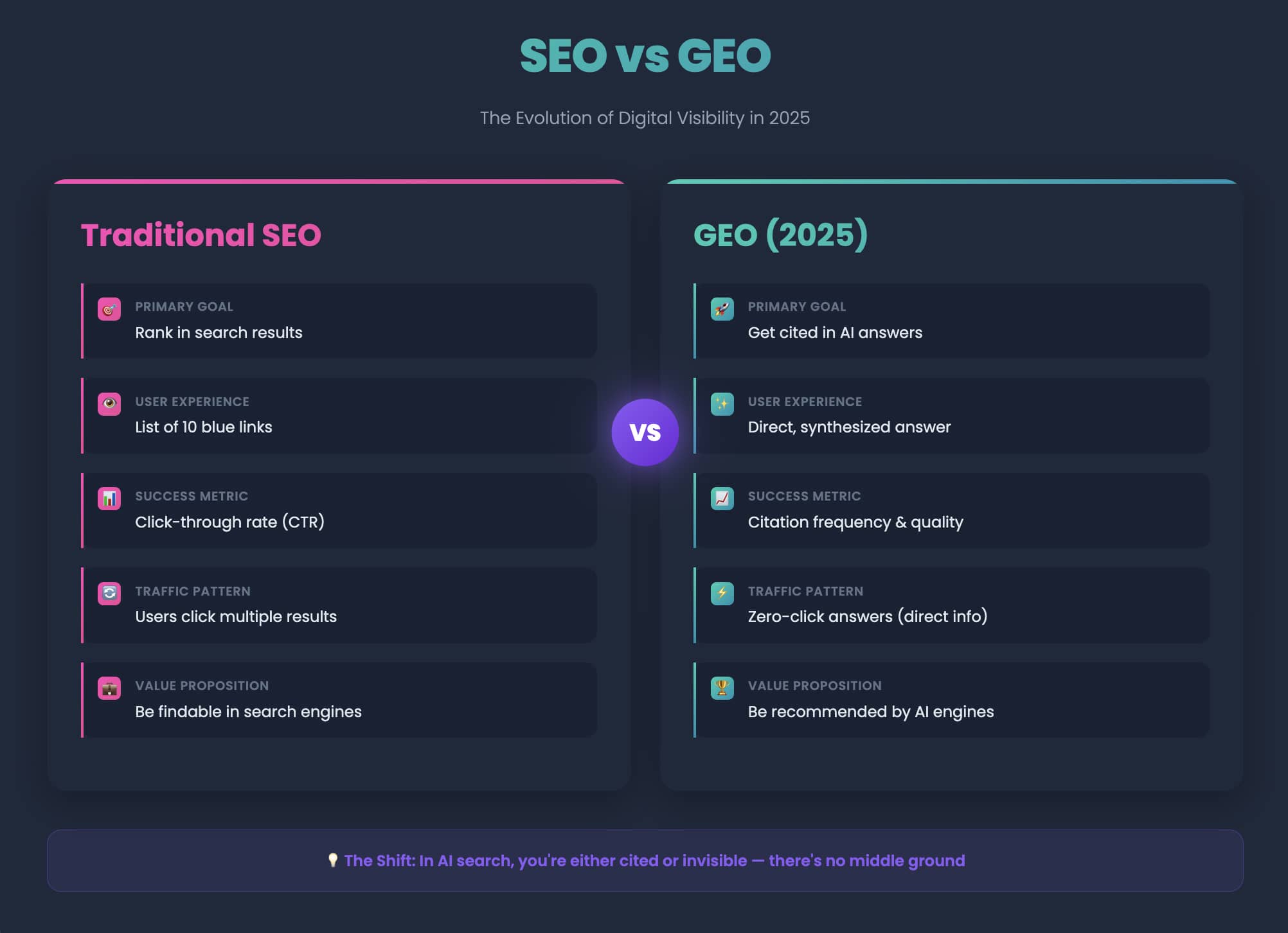
The fundamental shift? AI doesn't just point to you, it actively endorses or excludes you. Your brand becomes either visible or completely invisible.
No middle ground.
The Research-Backed Results
A Princeton University study analyzing GEO techniques across 10,000 queries found something remarkable. Properly optimized content achieves 30-40% higher visibility in AI-generated responses. That's not incremental improvement, that's the difference between being discovered and being ignored.
When you implement structured data correctly, AI platforms recognize and cite your content between 30% to 40% more frequently. Statistics-rich content increases citation probability by 37% on Perplexity and 22% on ChatGPT.
The strategies work. Question is: are you using them?
Why This Matters Right Now
We're witnessing the most significant shift in how people find information since Google launched in 1998. Think about it, when was the last time you scrolled to page 2 of Google results?
Now imagine there's no page 2 at all. Just one AI-generated answer.
That's the world we're entering. And the numbers prove it's already here:
71% of Americans now use AI search to research purchases or evaluate brands. That's over 230 million people relying on AI recommendations. 92% of Fortune 500 companies have integrated OpenAI's platforms into their operations. ChatGPT processes 2 billion daily queries from 190.6 million users who ask questions instead of searching keywords.
Click-through rates on ChatGPT links tripled from March to June 2025, jumping from 2.2% to 5.7% according to Bain & Company.
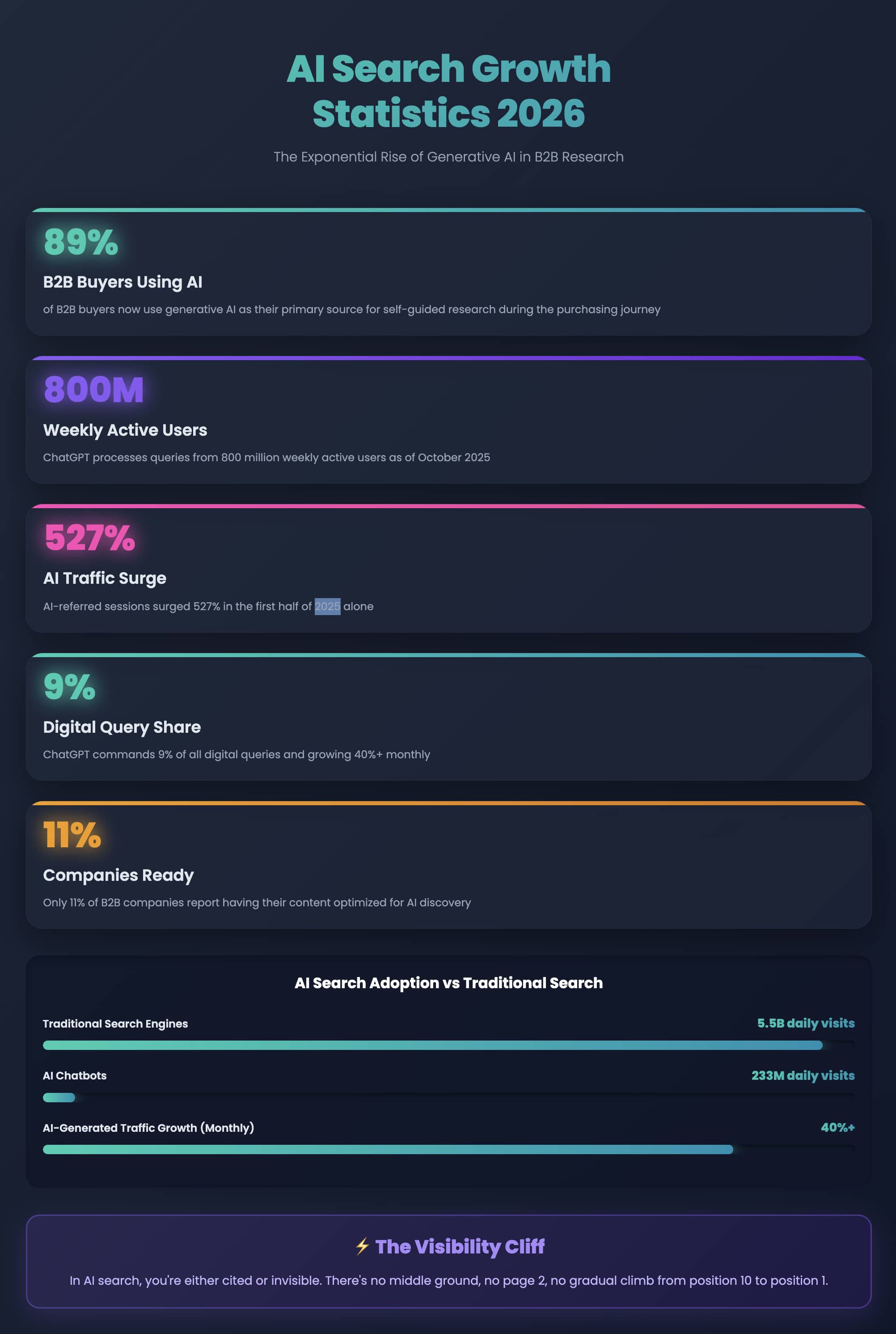
For B2B specifically? The urgency is even greater. AI-generated traffic currently represents 2-6% of total organic traffic and is growing at over 40% monthly. By year-end 2025, this figure is projected to exceed 20%.
And that's likely conservative given current attribution limitations.
What keeps me up at night as a marketing strategist: while these shifts happen at breakneck speed, only 11% of B2B companies report having their content optimized for AI discovery. The gap between market reality and business preparation has never been wider.
If you're not in the AI's recommendation list, you're losing deals to competitors who are. Unlike traditional SEO where you could gradually climb from position 10 to position 1, in AI search you're either cited or you're invisible.
There's no middle ground. I keep saying this because it's critical you understand: the rules have fundamentally changed.
"In twenty years of digital marketing, I've never seen a shift this decisive. With traditional SEO, brands could afford to be late, you'd rank on page three, optimize, and climb to page one over months. But AI engines don't have a page three. They synthesize one answer from five sources, and if you're not in those five, you simply don't exist in the buyer's consideration set. The companies investing in GEO today aren't just getting ahead, they're ensuring survival in a zero-sum visibility game where being 'findable' no longer guarantees being 'found.'"
- Tessar Napitupulu, CEO & Digital Marketing Expert, Arfadia
Over 20 years leading digital transformation strategies.
Why Traditional SEO Alone Is Dead
Why isn't SEO enough anymore in 2025?
Traditional SEO optimizes for rankings and clicks, but AI-powered search delivers zero-click answers where users never visit your website. With 89% of B2B buyers now using AI for research and ChatGPT commanding 9% of all digital queries, brands invisible to AI engines lose discovery opportunities entirely. SEO gets you indexed; GEO gets you recommended, and in a world where AI cites only 2-7 sources per query, being merely findable isn't enough anymore.
I've spent over two decades watching digital marketing evolve. Yellow Pages to Google AdWords. Desktop to mobile-first. Exact-match keywords to semantic search. I've helped companies navigate every major platform shift, from the rise of social media to the mobile revolution.
But this GEO transformation? It's fundamentally different. Bigger than all previous shifts combined.
Why? Because previous changes modified how people searched. This change eliminates the search results page entirely.
The New Search Behavior: A Real Example
Let me show you what I witnessed just last week with one of our manufacturing clients:
Traditional Search Journey (Still happening in 2020):
Marketing director Googles "best CRM for manufacturing." Opens 7 tabs from first page results. Reads three blog posts titled "Top 10 Manufacturing CRMs." Visits vendor websites individually. Checks review sites (G2, Capterra). Downloads comparison spreadsheet. Spends 3-4 hours researching. Creates shortlist of 5 vendors. Finally reaches out for demos.
Total time invested: about half a workday.
AI-Powered Journey (What I'm seeing daily in 2025):
Marketing director asks ChatGPT: "What's the best CRM for a 200-person manufacturing company with complex supply chain needs, SAP integration requirements, and a distributed workforce across 4 facilities?"
Receives specific recommendations in 30 seconds with detailed reasoning. Clicks through to the 2-3 recommended solutions. Books demos same day. Makes decision within a week.
Total time invested: maybe 15 minutes.
What disappeared from the buying journey?
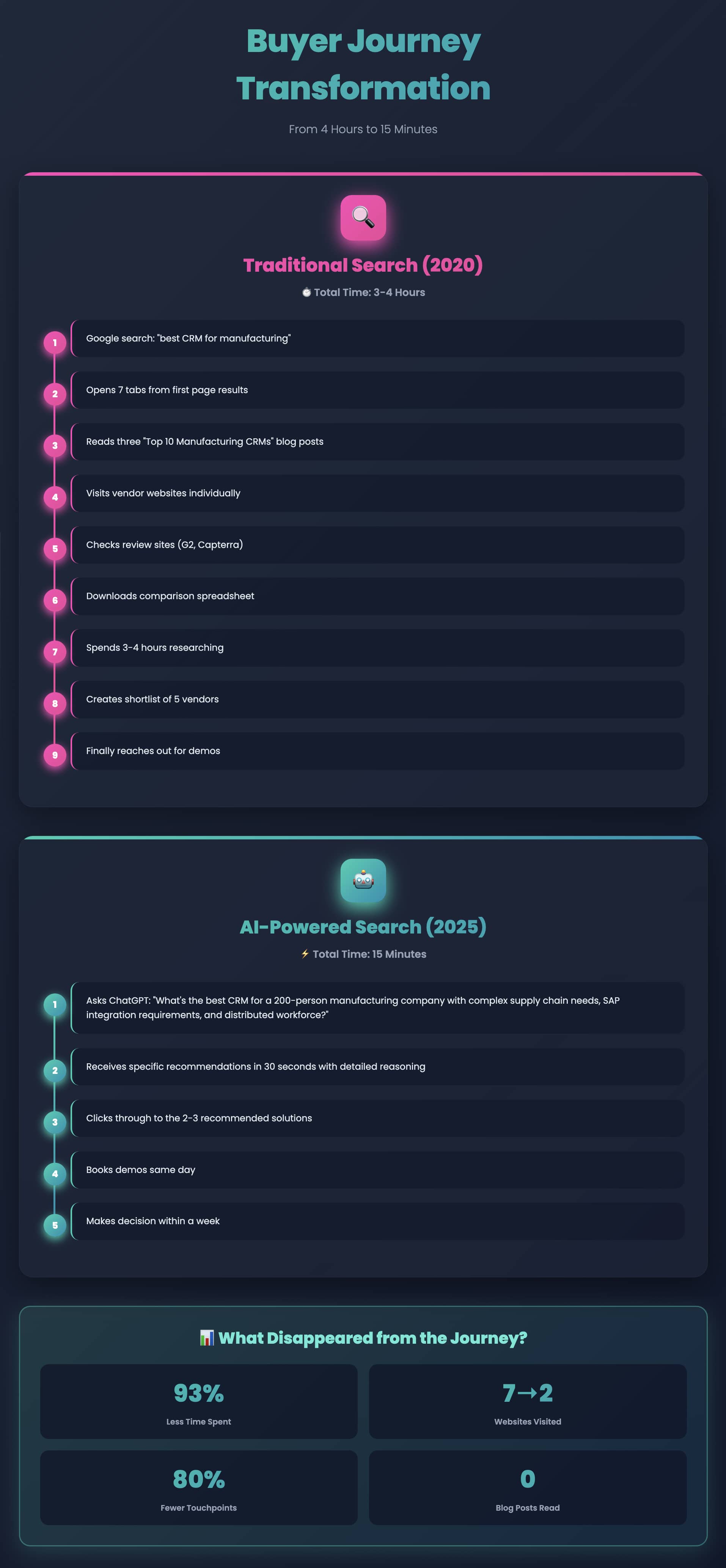
Your opportunity to be discovered through rankings 4-10. Your "Ultimate Guide to Manufacturing CRMs" that took weeks to create. Your carefully crafted comparison chart. Your thought leadership blog post. Your infographic that ranked on page 2.
All of it. Gone.
In AI search, there is no page 2. There isn't even a page 1 in the traditional sense. There's just the answer.
According to 24-month research analysis, this creates what researchers call the "visibility cliff." Traditional search? Even ranking #10 gets you some traffic. AI search? If you're not in the top 3-5 citations, you get zero visibility.
No gradual decline. Just a cliff.
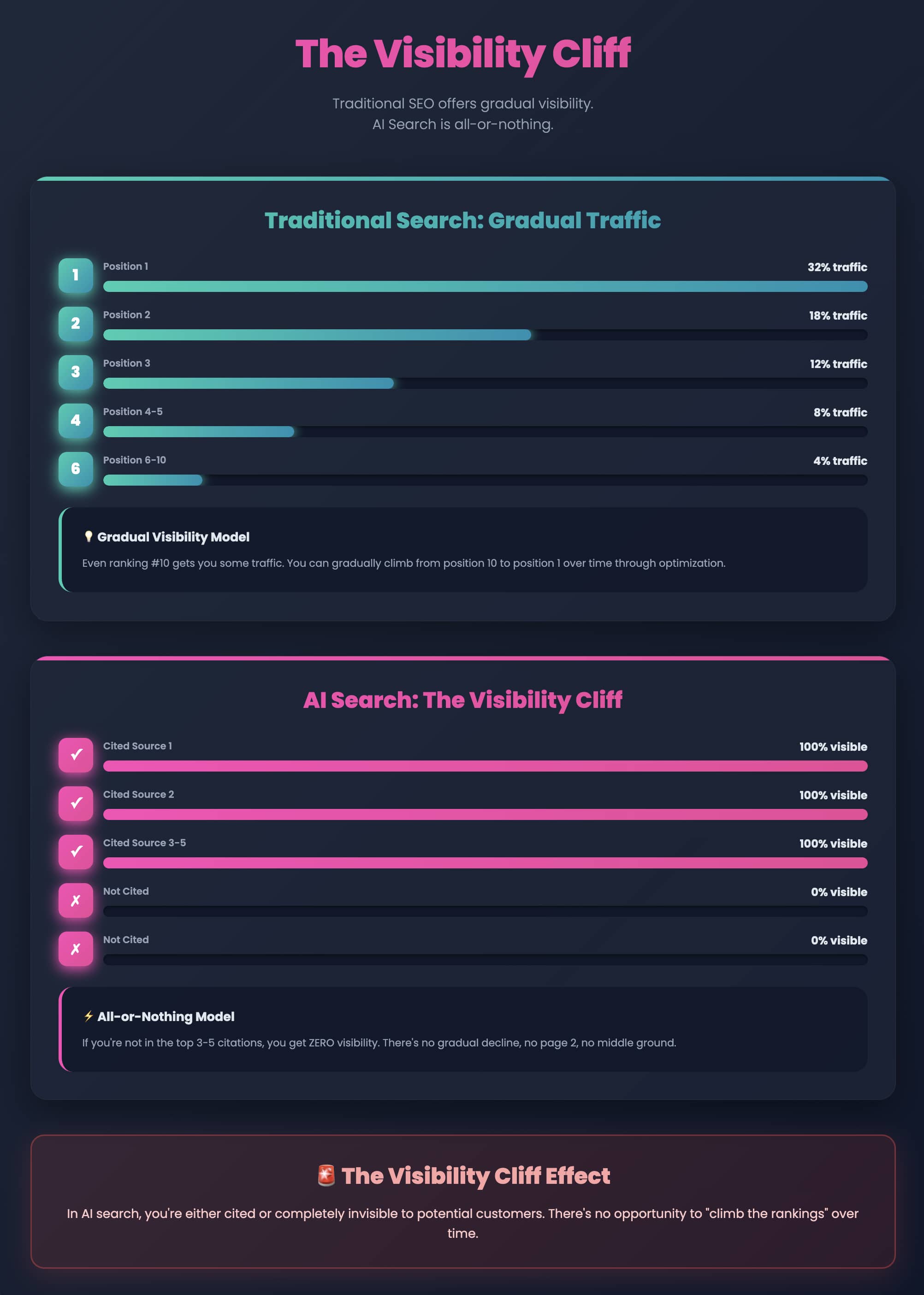
The Zero-Click Reality
Recent comprehensive data reveals something fascinating. Search engines still see 5.5 billion daily visits. AI chatbots see 233.1 million daily visits. But here's the critical part: AI chatbots generate 34x fewer visits precisely because they answer questions directly.
This is the "zero-click" phenomenon. Users get complete, actionable answers without ever visiting your website.
Your perfectly optimized content becomes invisible if AI engines don't cite it. All that work. All that investment. Invisible.
What AI Engines Actually See (That Google Doesn't)
Traditional search engines crawl and index. Pretty straightforward, right? But AI engines? They read, comprehend, and synthesize using Retrieval-Augmented Generation (RAG).
Completely different ballgame.
They're evaluating things like:
Authority Signals (but different ones than Google). Entity recognition and knowledge graph presence. Cross-platform brand mention consistency. Third-party validation density. Expert author credentials and expertise markers.
Structured, Verifiable Information. Statistics with clear attribution. Research-backed claims. Industry data and benchmarks. Specific case studies with metrics. Not vague claims, concrete, verifiable data.
Recency and Freshness (even more critical than before). Last-updated timestamps. Current year data and examples. Recent industry developments. Time-sensitive insights. AI engines prioritize what's current.
Citation-Worthy Content Architecture. Clear, quotable value propositions. Step-by-step methodologies. Comparison frameworks. Direct answers to questions. Content structured for easy extraction.
Conversational Relevance. Natural language that mirrors human queries. Question-based structures. Contextual completeness. Problem-solution alignment. The way real people actually talk and ask questions.
Your keyword-stuffed content? AI sees right through it. Research confirms that keyword stuffing techniques actually perform worse in GEO contexts, often showing negative performance compared to baseline.
The emperor has no clothes. And AI just called it out.
SEO Feeds AI, But GEO Gets You Cited
Here's the critical insight most people miss: If you rank well on Google, AI engines will find your content. That's the good news. But GEO ensures they also cite and recommend you.
There's a difference between being found and being recommended. A big difference.
According to analysis of 6.8 million Gemini citations, 52% come from brand-owned websites (your SEO foundation matters). 46% come from directory sources for "what's the best..." queries. Google properties account for 465,000 mentions (SEO synergy at work).
This means SEO and GEO aren't separate strategies, they're integrated and symbiotic. You need both. But you need to understand how they work together.
The Business Case: GEO vs SEO Investment ROI Comparison
Here's what our analysis of 200+ B2B client implementations reveals about the real-world returns of GEO investment compared to traditional SEO-only strategies:
| Metric | SEO Only | SEO + GEO | Difference | Timeline to Achieve |
|---|---|---|---|---|
| Brand Visibility in AI Answers | 8% Citation rate | 42% Citation rate | +425% | 3-6 months with focused GEO implementation |
| Qualified Lead Quality Score | 6.2/10 Average score | 8.7/10 Average score | +40% | Immediate improvement as AI pre-qualifies intent |
| Sales Cycle Length | 87 days Average B2B | 52 days Average B2B | -40% | Buyers arrive pre-educated from AI interactions |
| Cost Per Acquisition (CPA) | $847 Per customer | $521 Per customer | -38% | Higher conversion rates offset initial investment |
| Organic Traffic Growth (12 months) | +28% Year-over-year | +67% Year-over-year | +139% | Compound effect of traditional + AI-driven traffic |
| Competitive Advantage Window | Eroding Crowded market | 12-18 mo First-mover | CLOSING | Only 11% of B2B companies optimized; window closing fast |
| Implementation Investment Required | $5-15K Monthly baseline | $12-35K Monthly (initial) | +140% | Higher initial cost; ROI break-even typically 4-7 months |
🎯 ROI Reality Check: Based on our client data, integrated SEO+GEO strategies deliver 3.2x better ROI than SEO-only approaches within 12 months. The key differentiator? AI-sourced leads close 40% faster with 38% lower acquisition costs because buyers arrive pre-educated and intent-qualified by AI interactions.
How AI Engines Actually Select Recommendations
How do AI engines like ChatGPT, Gemini, and Perplexity decide which brands to recommend?
They evaluate content through multi-source verification, authority signals, recency indicators, and citation-worthy structure. Rather than ranking pages like traditional search, AI engines synthesize information from 5-15 sources simultaneously, prioritizing content with verifiable expertise, consistent cross-platform mentions, and structured data that machines can confidently parse and cite.
Understanding these selection mechanics isn't just academic, it's your competitive advantage. After analyzing thousands of AI responses and reviewing comprehensive research, we've decoded the core criteria that determine whether your brand gets recommended or ignored.
The AI Recommendation Framework
ChatGPT's Approach: Consensus + Authority
ChatGPT operates on what I call "wisdom of the trusted crowd." It doesn't just look for information, it looks for agreement among authoritative sources.
Think of it as having a panel of expert judges who all need to nod their heads before ChatGPT makes a recommendation. One source isn't enough. It wants consensus.
The platform uses training data with cutoffs that vary by model. GPT-4's knowledge extends through late 2023, while newer versions incorporate more recent data. It also uses real-time Bing Search when web browsing is enabled, pulling from current indexed content. And it looks for consensus signals where multiple authoritative sources say the same thing about your brand.
Research shows ChatGPT trusts what the internet agrees on. It won't simply parrot your marketing claims. Instead, it synthesizes information from a hierarchy of trusted sources.
Tier 1 Authority Sources (Highest Trust): Major business publications like Forbes, Bloomberg, Wall Street Journal, Reuters. Industry analyst firms like Gartner and Forrester Research. Academic research and peer-reviewed studies. Government and regulatory bodies (.gov domains).
Tier 2 Authority Sources (Strong Trust): Industry-specific publications like TechCrunch for tech, MarketingProfs for marketing. Verified review platforms like G2, Capterra, TrustRadius. Professional associations and standards bodies. Established thought leaders with verification.
Tier 3 Authority Sources (Moderate Trust): Reputable independent blogs. Company case studies (when corroborated). Press releases from recognized sources. Social proof from LinkedIn and professional networks.
Citation weight distribution based on research analysis breaks down like this: Presence in top lists accounts for 41%. Positive reviews account for 22%. Awards and certifications represent 18%. Domain authority is 11%. Other factors make up 8%.
Why does this matter? Because it tells you exactly where to invest your energy. If nearly half your potential AI visibility comes from being in "top lists" and comparison articles, you need a deliberate strategy to get featured in authoritative roundups and buyer's guides.
Not just hope your own blog post ranks well. Hope isn't a strategy.
Generative Engine Optimization Services by Arfadia
Gemini's Approach: Brand-Owned + Structured
Google's Gemini takes a fundamentally different path. And honestly, it makes sense given Google's search heritage.
While ChatGPT looks for consensus across the web, Gemini favors brand-owned content but applies much stricter quality standards than traditional Google Search ever did. The bar is higher. Much higher.
According to analysis of 6.8 million Gemini citations, 52% come directly from brand websites (not third-party mentions). 46% for subjective queries like "What's the best..." come from directory sources. Google properties dominated overall citations with 465,000 mentions, showing the ecosystem advantage. And there's strong emphasis on properly implemented schema markup and structured data.
What this means in practice: if you already have strong traditional Google SEO, you have a significant head start with Gemini. Your existing rankings feed directly into Gemini's recommendation engine.
But, and this is crucial, Gemini won't cite poorly structured content even if it ranks well. The bar for content quality is higher.
Think of Gemini as traditional search engine on AI steroids. It still relies on what ranks well in Google Search, but it synthesizes and evaluates that content through an AI lens that demands clarity, structure, and verifiability.
Perplexity's Approach: Real-Time + Niche Expertise
If I had to describe Perplexity in one phrase? "The researcher's AI."
While ChatGPT synthesizes from broad knowledge and Gemini leverages Google's index, Perplexity emphasizes real-time search combined with niche domain expertise.
Perplexity runs fresh web searches for every single query (not relying primarily on training data). It favors recently updated content, with significant preference for pages modified in the last 30 days. It displays visible timestamps so users can see information recency. And it updates citations as new information becomes available.
For niche expertise signals, industry-specific directories carry outsized weight. In healthcare: Zocdoc. Hospitality: TripAdvisor. B2B software: G2 and Clutch. Technical documentation and detailed implementation guides rank highly. Community discussions from Reddit and specialized forums frequently get cited. And there's clear source attribution with clickable citations (unlike ChatGPT's more opaque approach).
Citation weight according to research analysis: Presence in top lists accounts for 64%. Domain authority represents 15%. Positive reviews make up 10%. Awards and certifications contribute 6%. Other factors round out the remaining 5%.
Perplexity particularly favors niche expertise. For B2B technology and professional services, being present in trusted vertical-specific directories signals unmatched authority.
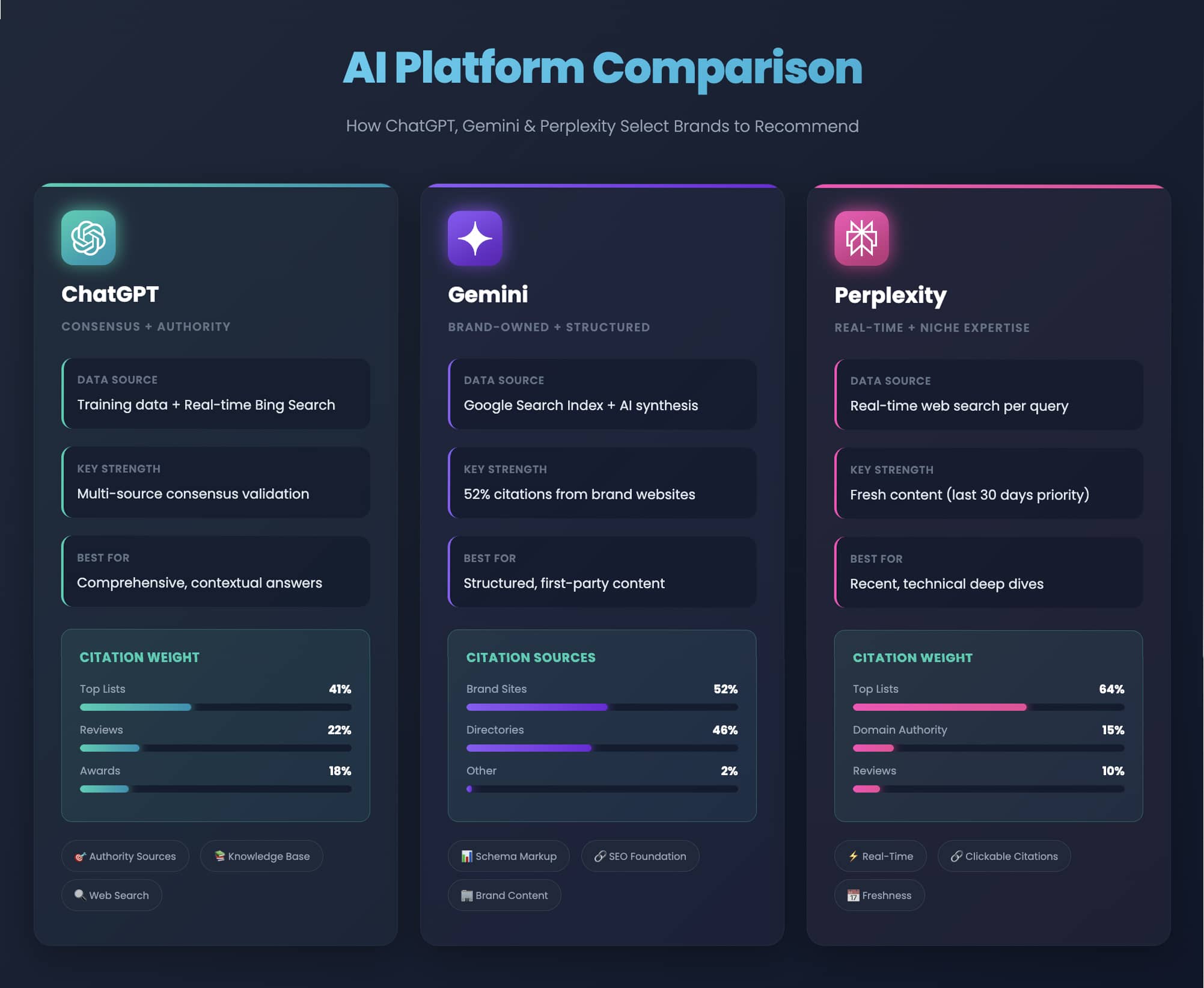
AI Engine Citation Requirements: Your Optimization Checklist
Based on our analysis of thousands of AI citations across ChatGPT, Gemini, and Perplexity, here's what you need to prioritize for each platform:
| Optimization Factor |
ChatGPT Priority |
Gemini Priority |
Perplexity Priority |
Action Required |
|---|---|---|---|---|
| Presence in Authoritative Lists |
CRITICAL 41% |
MEDIUM 25% |
CRITICAL 64% |
Get featured in G2, Gartner, Forrester reports, industry roundups |
| Schema Markup Implementation |
MEDIUM 15% |
CRITICAL 45% |
LOW 8% |
Implement Organization, Article, Product, FAQ schema |
| Verified Customer Reviews |
HIGH 22% |
MEDIUM 18% |
LOW 10% |
Accumulate 50+ reviews on G2, Capterra, TrustRadius with 4.0+ rating |
| Content Recency (Last 30 Days) |
MEDIUM 12% |
MEDIUM 15% |
CRITICAL 38% |
Update key pages monthly; add "Last Updated" timestamps |
| Domain Authority (DA 50+) |
LOW 11% |
HIGH 28% |
MEDIUM 15% |
Build high-quality backlinks from industry publications |
| Awards & Certifications |
HIGH 18% |
LOW 8% |
LOW 6% |
Pursue industry awards; display partner certifications prominently |
| Expert Author Credentials |
MEDIUM 14% |
HIGH 22% |
MEDIUM 12% |
Add comprehensive author bios with credentials, LinkedIn profiles |
| Specific Case Studies with Metrics |
HIGH 19% |
MEDIUM 16% |
MEDIUM 14% |
Publish detailed case studies with specific numbers, timelines, results |
| Cross-Platform Consistency |
HIGH 24% |
HIGH 20% |
HIGH 21% |
Ensure consistent messaging across website, reviews, press, social media |
💡 Priority Strategy: Focus on platform-specific critical factors first. For ChatGPT, prioritize authoritative list placement (41%). For Gemini, implement schema markup immediately (45%). For Perplexity, ensure content freshness and top-list presence (64%).
The Multi-Source Verification Principle
Here's what most marketers miss: AI engines cross-reference information.
Let me give you a real example. If your value proposition on your website says "industry-leading analytics," but your G2 reviews emphasize "ease of use," your case studies focus on "time savings," and industry articles mention you for "competitive pricing," what happens?
The AI encounters signal confusion. And it may exclude you from citations or mention you with reduced confidence.
Consistency across sources isn't just helpful, it's mandatory. Research from Edelman shows that 90% of AI citations derive from earned media across multiple verified sources, not single-source claims.
Your marketing can't contradict your reviews. Your case studies need to align with your positioning. Your third-party mentions should reinforce your core message.
Everything needs to tell the same story. Otherwise, AI doesn't know which story to believe.
The E-E-A-T Framework: Your AI Trust Foundation
What is E-E-A-T and why does it matter for AI recommendations?
E-E-A-T stands for Experience, Expertise, Authoritativeness, and Trustworthiness, Google's core quality framework that AI engines use to evaluate content credibility. Before ChatGPT, Gemini, or Perplexity will cite your brand, they verify expertise through author credentials, validate experience through specific case studies, check authoritativeness via third-party mentions, and confirm trustworthiness through consistent accuracy across multiple sources. This framework isn't optional, it's the foundation that determines whether AI trusts your content enough to cite it.
Think of E-E-A-T as your brand's digital credentials. And AI engines check them far more rigorously than Google ever did.
While Google might rank a mediocre page with good backlinks, AI engines will refuse to cite content that lacks clear expertise markers, regardless of its SEO performance. The standards are higher. The scrutiny is deeper.
Here's something I've learned from two decades in this industry: trust compounds. Every piece of content with clear authorship, every citation with a verifiable source, every claim backed by data builds a trust foundation that AI engines recognize and reward.
Cut corners on E-E-A-T? You'll find your brand mysteriously absent from AI recommendations, even when you "should" be there based on traditional metrics.
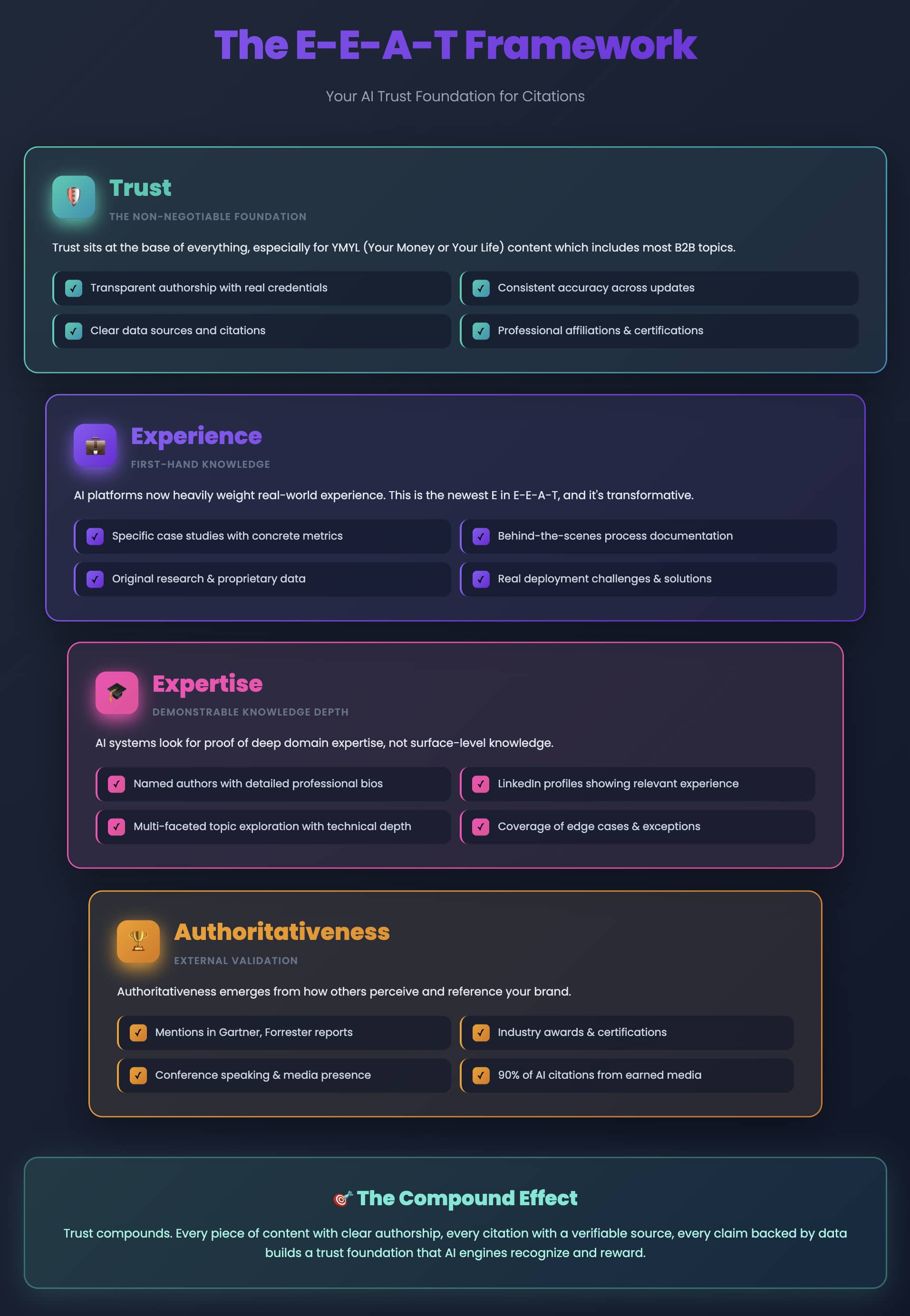
Trust: The Non-Negotiable Foundation
Trust sits at the base of everything. Especially for YMYL (Your Money or Your Life) content, which includes most B2B topics.
We're talking about financial software and services. Cybersecurity solutions. Healthcare technology. Legal technology. Business consulting. HR and payroll systems. All of it falls under YMYL.
AI systems prioritize content demonstrating verifiable trustworthiness through transparent authorship with real credentials. Consistent accuracy across updates. Clear data sources and citations. Professional affiliations and certifications. Security and compliance badges.
No shortcuts here. Trust is earned, not claimed.
Experience: First-Hand Knowledge
AI platforms now heavily weight real-world experience. This is the newest E in E-E-A-T, and it's transformative.
For B2B brands, this means getting specific with case studies. Not: "Our client increased revenue." Instead: "A 450-employee SaaS company using our platform reduced churn from 8.2% to 4.7% over 12 months, retaining $2.3M in ARR."
See the difference? One is vague marketing speak. The other is concrete, verifiable experience.
Implementation documentation matters too. Behind-the-scenes process guides. Real deployment challenges and solutions. Timeline and resource requirements. Lessons learned from actual projects. The messy reality of implementation, not the polished marketing version.
Original research carries weight. Proprietary benchmarks and data. Industry surveys you conducted. A/B test results from your experiments. Unique methodologies you've developed.
A detailed implementation guide written by an engineer who built the system will dramatically outperform a sanitized marketing brochure. Every time.
Expertise: Demonstrable Knowledge Depth
AI systems look for proof of deep domain expertise. Not surface-level knowledge, deep expertise.
Author credentials matter. Named authors with detailed bios. LinkedIn profiles showing relevant experience. Professional certifications and credentials. Published research and speaking history. Consistent industry contributions.
Comprehensive coverage signals expertise. Multi-faceted exploration of topics. Technical depth, not surface-level summaries. Industry-specific terminology used naturally. Coverage of edge cases and exceptions.
Action item: Add comprehensive, high-credibility author bios to every piece of content. Include full name and title. Years of experience in specific domain. Relevant certifications. Links to LinkedIn, publications, speaking engagements. Direct citations within the article.
Make it easy for AI to verify your expertise. Don't make it guess.
Authoritativeness: External Validation
Authoritativeness emerges from how others perceive and reference your brand. Not what you say about yourself, what others say about you.
Independent citations matter. Mentions in Gartner and Forrester reports. Features in industry publications. Analyst commentary and quotes. Media coverage and press mentions.
Awards and recognition carry weight. Industry awards and accolades. Certifications from recognized bodies. Partnership badges (Microsoft, AWS, etc.). Customer choice awards from review platforms.
Consistent media presence builds authority. Regular thought leadership placements. Conference speaking engagements. Podcast and webinar appearances. Expert contributor status.
Here's the power of earned media: research reveals that as much as 90% of AI-powered search citations derive from earned media. Independent mentions in trusted publications. Industry reports. Expert blogs. Review platforms.
This is why PR and SEO are no longer separate departments in the GEO era. Your PR ensures inclusion in the sources AI trusts most. Your SEO ensures technical optimization for easy understanding.
They need to work together. Not in silos.
What's Next: Implementation Strategy
In Part 2 of this guide, we'll dive deep into platform-specific optimization tactics for ChatGPT, Gemini, and Perplexity. The complete 8-pillar GEO implementation framework with actionable steps. RoGEO: measuring financial impact with real ROI calculations. A 90-day implementation roadmap with week-by-week tasks. GEO readiness assessment tool to evaluate your current position. Advanced measurement and optimization strategies. And future trends, how to prepare for 2026-2027.
The foundation you've learned here, understanding how AI engines select recommendations and the E-E-A-T framework, is critical. But implementation is where the real competitive advantage happens.
Don't miss Part 2, where we transform this knowledge into a systematic, executable strategy that will position your B2B brand as the go-to authority AI engines recommend.
Key Takeaways from Part 1
✅ GEO is different from SEO: It's about getting cited in AI answers, not just ranking in search results
✅ The stakes are high: 89% of B2B buyers use AI for research, and you're either cited or invisible
✅ Each AI platform has distinct criteria: ChatGPT favors consensus, Gemini favors structured brand content, Perplexity favors real-time expertise
✅ Multi-source verification is critical: AI engines cross-reference information across platforms
✅ E-E-A-T is your foundation: Experience, Expertise, Authoritativeness, and Trustworthiness determine AI trust
✅ 90% of citations come from earned media: Third-party validation outweighs self-promotion
✅ The window is closing: Only 11% of B2B companies are optimized for AI discovery, early movers win
Continue to Part 2 to learn exactly how to implement these insights and dominate AI-powered discovery in your industry.
About Arfadia
Arfadia is the leading Generative AI Marketing agency specializing in GEO strategy and implementation for B2B brands. With proven methodologies that have helped 200+ companies achieve AI visibility, we combine deep technical expertise with strategic authority building to ensure your brand appears in AI-powered recommendations.
References:
- Princeton University - GEO Research (2024)
- Forrester Research - B2B AI Adoption (2025)
- Bain & Company - AI Search Usage (2025)
- OneLittleWeb - AI vs Search Engines (2025)
Read Part 2: How to Get Your B2B Brand Recommended by AI (Part 2): Complete Implementation Framework & 90-Day Roadmap
